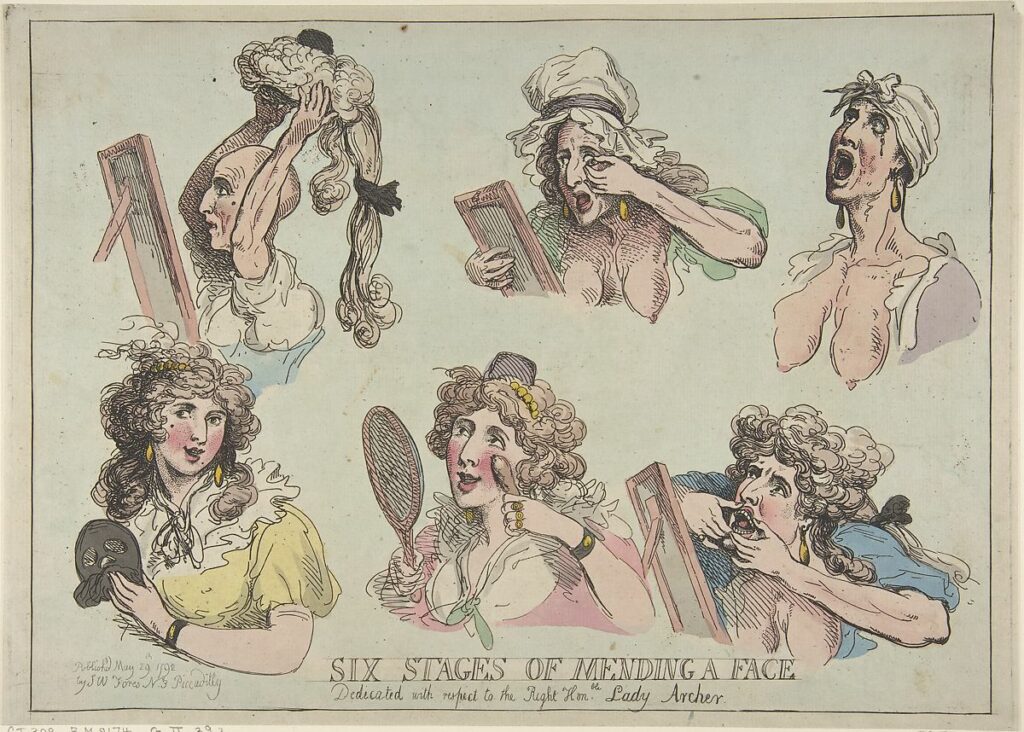“Youth is wasted on the young,” they say. As we grow older, it is perhaps inevitable that we look back on our early life with a sense of regret and a desire to start again. In German poetry this sense of disjunction is part of the idea of ‘Sehnsucht’, longing for an unattainable homeland which we feel was once within our grasp or from which we have been alienated.
Goethe’s Mignon (in his novel Wilhelm Meister) is the embodiment of this sense of longing. Although she is still young, she aged prematurely. She was abducted (and probably abused) as a child and has been forced to act a role ever since. The lyrics that allow us to overhear her inner yearnings suggest that she has given up hope of finding fulfilment in this life. Only death and resurrection will bring about any realistic form of rejuvenation.
So lasst mich scheinen, bis ich werde,
Zieht mir das weiße Kleid nicht aus,
Ich eile von der schönen Erde
Hinab in jenes feste Haus.
Dort ruh ich eine kleine Stille,
Dann öffnet sich der frische Blick,
Ich lasse dann die reine Hülle,
Den Gürtel und den Kranz zurück.
Und jene himmlischen Gestalten,
Sie fragen nicht nach Mann und Weib,
Und keine Kleider, keine Falten
Umgeben den verklärten Leib.
Zwar lebt' ich ohne Sorg und Mühe,
Doch fühlt' ich tiefen Schmerz genung,
Vor Kummer altert' ich zu frühe,
Macht mich auf ewig wieder jung.
Let me appear in this form until that is what I have become,
Do not take off my white dress!
I am hurrying away from the beautiful earth
Down into that secure house.
I shall rest there for a brief period of silence
And then a fresh view will open up;
I shall then leave the pure covering,
I shall leave the sash and the garland behind.
And those heavenly figures
They do not ask about male and female,
And no clothes, no folding drapery
Will be wrapped around the transfigured body.
It is true that I lived without cares and worries
But I felt enough deep sorrow.
I aged from grief all too early;
Make me young again for ever.
Goethe, Mignon D 469, D 727, D 877/3
On a more abstract level, the ‘Hymns of the Night’ by Novalis echo this longing for death. The phrase he uses in Nachthymne is ‘des Todes verjüngende Flut’, ‘death’s rejuvenating tide’:
O, sauge, Geliebter,
Gewaltig mich an,
Dass ich entschlummern
Und lieben kann.
Ich fühle des Todes
Verjüngende Flut,
Zu Balsam und Äther
Verwandelt mein Blut.
Oh, beloved, absorb
Me powerfully
So that I can fall I asleep
And so that I can love.
I can feel death's
Rejuvenating tide,
Into balsam and ether
My blood is being transformed.
Novalis, Nachthymne D 687
For the less pious Mayrhofer, though, rejuvenation is limited to the annual reboot that we call ‘spring’. Trees and plants might start again. Flowers and birdsong might lift the spirits of those who are still alive, but dead humans continue to decompose. The dead get deader!
Im Wald, im Wald da grabt mich ein,
Ganz stille,ohne Kreuz und Stein,
Denn was ihr türmet, überschneit
Und überrindet Winterszeit.
Und wann die Erde sich verjüngt
Und Blumen meinem Hügel bringt,
Das freut euch Guten, freuet euch,
Dies alles ist dem Toten gleich.
Doch nein, denn eure Liebe spannt
Die Äste in das Geisterland,
Und die euch führt zu meinem Grab,
Zieht mich gewaltiger herab.
In the forest, in the forest, that is where you should bury me,
In total silence, without any cross or stone:
Since the heap that you are making will be covered with snow
And ice by the winter weather.
And when Earth rejuvenates itself
And brings flowers to my mound,
Then rejoice, good people, rejoice!
It is all the same to the dead.
But no - since your love spreads
Its branches into the land of the spirits,
And what leads you towards my grave
Pulls me more powerfully downwards.
Mayrhofer, An die Freunde D 654
☙
Descendant of:
THE COURSE OF HUMAN LIFE: From the cradle to the grave TIMETexts with this theme:
- An Chloen, D 363 (Johann Peter Uz)
- Lebens-Melodien, D 395 (August Wilhelm Schlegel)
- Mignon (So lasst mich scheinen), D 469, D 727, D 877/3 (Johann Wolfgang von Goethe)
- An die Freunde, D 654 (Johann Baptist Mayrhofer)
- Hymne IV (Geistliches Lied), D 662 (Friedrich Leopold von Hardenberg (Novalis))
- Nachthymne, D 687 (Friedrich Leopold von Hardenberg (Novalis))
- Totengräber-Weise, D 869 (Franz von Schlechta)


